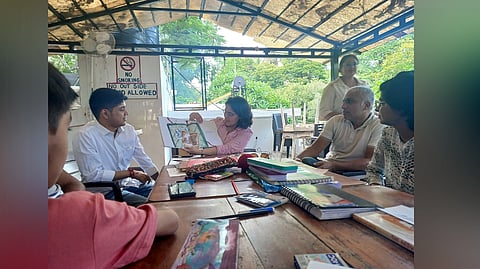

HYDERABAD: “If you had to suddenly leave home, what are five most important things you’d take with you? Think, think, think, now draw it, come on!” Oh my-my, what a difficult decision. With serious faces and varying degrees of wrinkles, we start to scribble away using our crayons and sketch pens. Ten minutes later, we hold our sheets up, gawking with childlike excitement and eagerly showing off our artwork. This is just the start of psychotherapist Arushi Ralli’s ‘Children’s Books Are For Everyone’ workshop on a rainy Sunday evening in Lamakaan.
Sipping our Irani chais, we—teenagers, 20-somethings, 30-somethings and middle-agers—look on in awe at the children’s books that lie before us. We start with The Suitcase, written by Chris Naylor-Ballesteros.
Arushi tells us to stand up and read one page of the book to everyone else. Now, there is a catch. “Pause and wait after each page so everyone can ponder and share their interpretations. Don’t just read but read between the lines,” she instructs. So, if the peculiar-looking creature in The Suitcase leaves home with his most important things, we didn’t just say, ah, he left home with his suitcase. We observe his emotions and attempt to understand his trials and tribulations. Without us even knowing it, Arushi makes us see the story from our own psycho-social-emotional lens. And no, this isn’t the grown-up world where each of us sneer and chuckle at the other for being ‘out of line’.
Here, we can be 35 years old but still say, “I don’t understand that page.” There are several instances in the workshop where we uncover our own biases and subconscious perceptions of the world—who knew children’s books are loaded with that much intelligence?
But the best book is undoubtedly The Artivist by Nikkolas Smith, where a little African-American protagonist uses his artistic skills to tackle issues such as poverty, race, LGBTQIA+ and environmental issues—all of which are burning problems in India too.
Some of us even grow a little emotional. After all, these issues are never spoken about, are they? Suddenly, we feel energised. Arushi, of course, knows exactly what to ask of us, giving us sheets of paper and instructing, “Draw, doodle or write how you want to bring change.”
As we clip our drawings on a yarn string, we feel like proud preschoolers! The feeling of minting profits in the stock market or writing the perfect code for the latest software solution cannot even hold the tiniest candle to the happiness we feel looking at our creative visions.
“Such books need to be introduced in schools too. Children need to be exposed to the topics that really matter in the world. Well, that said, I feel like a happy child in this workshop,” says 38-year-old Namrata, mother of a seven-year-old boy.
Arushi’s mission is to get more adults to come together and read children’s books. “When I was going through a personally trying time, I came across the book Junkyard Wonders by Patricia Polacco. It was magical and helped me cope in a way.
As adults, we are so boxed up, aren’t we? In a world where we are exposed to such heavy content and children are bombarded with text-packed books, I want to prove that you don’t need heavy text to make sense of the world. As adults, we need to be in touch with the child inside us,” says Arushi Ralli.
We go home feeling incredibly light yet filled with new ideas and perspectives. Indeed, Arushi’s workshop doesn’t just invoke the child in you but wakes up the nonchalant adult too.